In a world brimming with health trends and dietary advice, it’s easy to fall prey to the misconception that certain foods are healthier than they actually are. This article aims to shed light on some commonly consumed foods that, contrary to popular belief, aren’t as beneficial for your health as you might think. The influence of marketing and a general lack of detailed nutritional information have contributed to these widespread misunderstandings. Here, you’ll discover the truth behind these unhealthy foods, ranging from breakfast favorites to popular snacks, and learn how to make smarter, healthier choices in your diet.
Contents
Flavored Yogurt

Flavored yogurt is often lauded as a healthy snack, rich in calcium and essential nutrients. However, many are unaware of the high sugar content that these yogurts can contain, which can negate their health benefits. A single serving of some flavored yogurts can have as much sugar as a candy bar, turning a healthy choice into a sugary trap. This excess sugar can contribute to various health issues, including weight gain and an increased risk of diabetes. In contrast, plain yogurt, particularly Greek yogurt, offers high protein content and probiotics without the added sugars.
The key to enjoying yogurt healthily is to avoid added sugars and opt for natural, unsweetened varieties. If the tartness of plain yogurt doesn’t appeal to you, consider adding fresh fruit, nuts, or a drizzle of honey to enhance its flavor naturally. This approach allows you to control the amount and quality of the sweetener. Additionally, reading labels carefully can help you choose a yogurt that’s genuinely beneficial for your health. By making these smart choices, you can enjoy the nutritional benefits of yogurt without the unhealthy sugar content.
Granola and Granola Bars
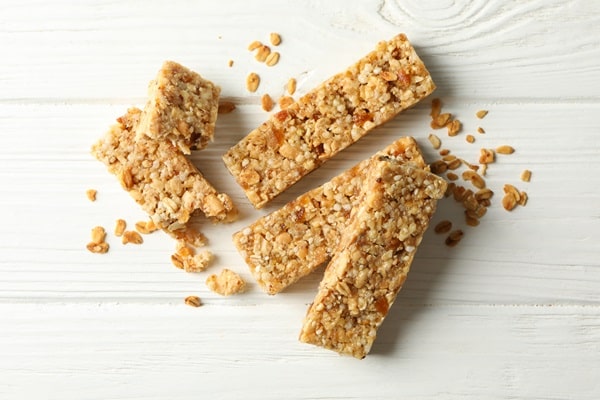
Granola, often associated with health and wellness, can be misleading in its nutritional value. Many store-bought granolas and granola bars are laden with added sugars and unhealthy fats, which can contribute to weight gain and other health issues. While granola does contain healthy ingredients like oats and nuts, the benefits are often overshadowed by the high calorie and sugar content. This is particularly true for granola bars, which can also contain added preservatives and artificial ingredients.
To enjoy granola in a healthier way, consider making it at home, where you can control the ingredients. Homemade granola allows you to reduce sugar and fat while still enjoying the crunchy, satisfying texture. When shopping for granola or granola bars, look for options with minimal added sugars and natural ingredients. Be wary of health claims on packaging and always check the nutritional information. By doing so, you can ensure that your granola choice is not only delicious but also a genuinely healthy addition to your diet.
Bottled Smoothies
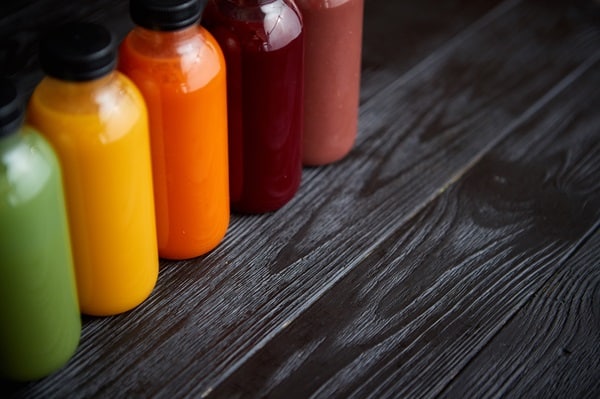
Bottled smoothies are often marketed as a nutritious, convenient meal replacement or snack. However, many of these products are high in sugar and lack the fiber found in homemade smoothies. The sugar in these bottled beverages can come from both added sugars and concentrated fruit juices, leading to a high-calorie count. This can be particularly misleading as consumers often view them as a healthy alternative to sodas or other sweetened drinks.
To reap the benefits of smoothies, consider making them at home using whole fruits, vegetables, and other healthy ingredients. Homemade smoothies allow you to control the sugar content and ensure you’re getting the fiber and nutrients that whole fruits provide. When choosing a bottled smoothie, look for those with no added sugars and a short list of recognizable ingredients. Remember, the healthiest smoothies are those made with whole, unprocessed ingredients, offering a balance of vitamins, minerals, and fiber.
Diet and ‘Zero’ Sugar Sodas
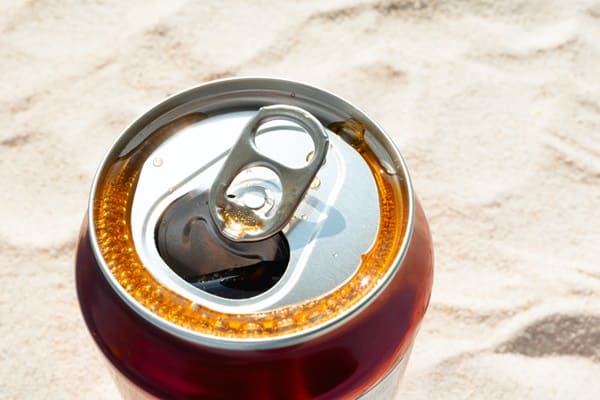
Diet sodas and ‘zero’ sugar beverages are often chosen as guilt-free alternatives to their sugary counterparts. However, the artificial sweeteners used in these drinks, such as aspartame and sucralose, have been the subject of health debates. While they are low in calories, these sweeteners may have potential health impacts, including affecting gut health and possibly leading to increased cravings for sweet foods. Additionally, the consumption of diet sodas has been linked in some studies to an increased risk of certain health issues, though more research is needed in this area.
Beyond the physical health concerns, diet sodas can also impact eating habits and food choices. The sweet taste of artificial sweeteners, despite being calorie-free, can still trigger the brain’s reward pathways similarly to regular sugar. This can lead to an increased appetite for sweet, high-calorie foods, potentially undermining weight management efforts. For healthier beverage choices, consider water, herbal teas, or infused water with natural fruits. These alternatives provide hydration without the potential negative effects of artificial sweeteners found in diet sodas.
Pre-Made Salad Dressings
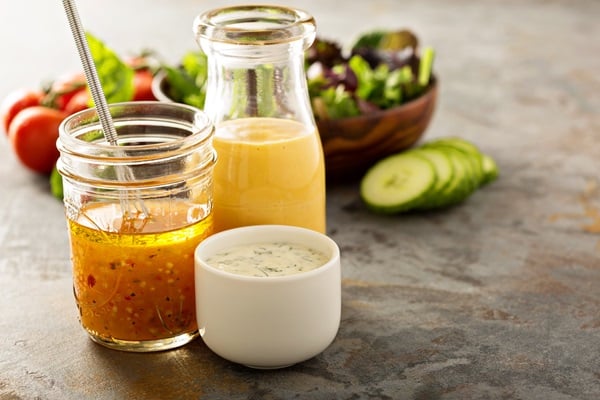
Pre-made salad dressings are a staple in many households, offering convenience and flavor. However, many of these dressings are high in calories, unhealthy fats, sugars, and sodium, which can turn a healthy salad into a less nutritious meal. The high-calorie content, primarily from oils and sugars, can significantly increase the calorie count of your salad, while the high sodium levels can contribute to increased blood pressure and other health issues.
To enjoy salads without compromising on health, consider making your own dressings using simple, fresh ingredients. Homemade dressings can be made with a base of olive oil, vinegar, or yogurt and flavored with herbs, spices, and citrus. This allows you to control the ingredients and their proportions and also avoids preservatives and additives found in store-bought dressings. With a little bit of experimentation, you can create a variety of healthy dressings that enhance your salads without the unhealthy extras.
Energy Bars

Energy bars are commonly consumed as a quick energy boost or meal replacement, especially among those with active lifestyles. However, not all energy bars are created equal. Many contain high levels of sugar, unhealthy fats, and calories, similar to candy bars. They can also be packed with artificial ingredients and preservatives, diminishing their nutritional value. While some bars do offer a good mix of protein, fiber, and healthy fats, it’s important to choose wisely.
For a healthier alternative, look for energy bars with minimal added sugars, whole food ingredients, and a balance of protein, fiber, and healthy fats. Better yet, consider making your own energy bars at home. Homemade bars can be made with nuts, seeds, whole grains, and natural sweeteners like dates or honey, providing a nutritious and energy-boosting snack. This way, you can avoid the pitfalls of processed bars and enjoy a truly healthy, energizing treat.
Gluten-Free Packaged Foods
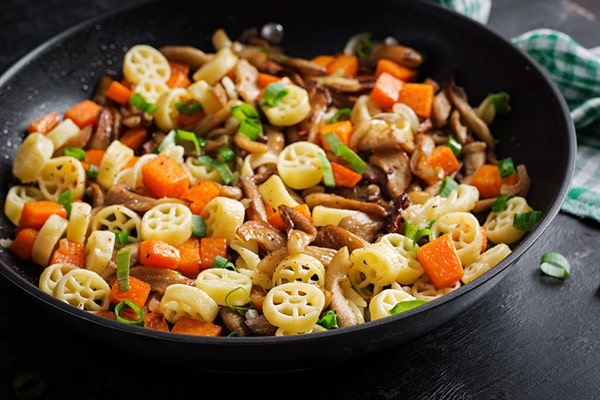
The rise in popularity of gluten-free diets has led to an increase in gluten-free packaged foods, often perceived as healthier options. However, just because a product is labeled gluten-free doesn’t mean it’s healthier. Many of these products are highly processed and can be high in sugar, fat, and calories while lacking essential nutrients. The absence of gluten often leads to the use of alternative flour and starches, which can result in a higher glycemic index and reduced fiber content.
For those who do not have a medical need to avoid gluten, such as those with celiac disease or gluten sensitivity, it’s essential to focus on the overall nutritional profile of foods rather than just the absence of gluten. Whole, naturally gluten-free foods like fruits, vegetables, lean proteins, and certain grains are healthier choices. If you do need to follow a gluten-free diet, opt for minimally processed foods and be mindful of the nutritional content, ensuring a balanced and nutrient-rich diet.
Empower Your Diet with Informed Choices
The journey to healthier eating is about understanding what truly goes into your food. This article has highlighted the importance of looking past marketing claims and examining the real nutritional content of what you eat. By being an informed consumer and choosing whole, unprocessed foods, you can significantly improve your dietary habits. Remember, knowledge is power, especially when it comes to nutrition. Empower your diet with informed choices, and embrace a healthier lifestyle starting today.


